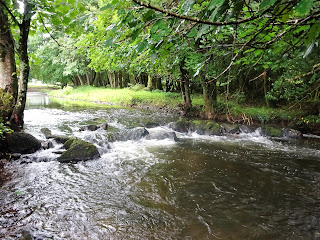Ed 19 River Monitoring explained
Over a year ago, in Ed 5, I mentioned ‘river monitoring’ but
have only just realised, mea culpa, that I haven’t explained what that’s about.
I worked in the construction industry most of my career, and way back when, learning
the ropes on site, the foreman said “Never ASSUME, because if you do you might
make an ASS out of U and ME”. So, apologies, here comes a bit of rectification:
In the UK the ‘River Monitoring Initiative’ essentially exists to monitor the health of our precious rivers and provide early warning when things seem to be going awry. How this works is that volunteers sample specific sites on key rivers for eight particular types of invertebrate life, using a controlled approach. Each site has a ‘trigger score’ set, and if the monthly monitoring produces a score below this level, then the alarm bells are sounded. My fishing buddy and I monitor two separate sites on a Hampshire chalkstream much less well-known than its cousins, the Rivers Itchen and Test. Our results also go onto a national database so trends can be watched. Then came the cursed Covid-19, and lockdowns put the mockers on large chunks of 2020 and 2021. Happily, this month we were able to get back into it – it felt really, really good to be once again doing our thing in the water, and even better to calculate the results of our sampling, which confirmed the buggy results were way above our trigger scores of 7!
Okay, it’s not fishing, but kick-sampling the gravels, sweeping through weed with the net, and stone turning, etc., wadered-up and immersed in the river felt simply wonderful. It went completely off the scale when we discovered a little jewel-like, wild brown trout in the net!








Comments
Post a Comment
Comments and/or feedback are always welcome